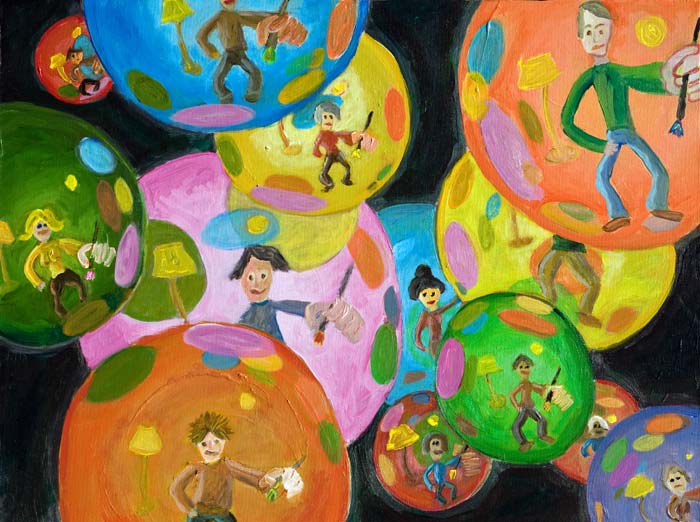
Off-Track Betting
by Madeline Ashby

The Motes let Xian go, and she tucked herself, twitching and sweating, into a loose ball until the crane plucked her like fruit from her sector of the performance space. The Motes really had a lot to say, this session, and her body had contorted in ways it hadn’t since her People’s Colonial Circus days: her toes near her eyes, her spine a half-circle. A nurse pulled Xian’s collar down and slapped on a pain patch. Xian’s body, so light in this space, took on a false heaviness as the drug worked at softening the impact of what the Motes’ molecular machines had done to it. Someone gave her a drink – potassium and sodium chloride and all the chemicals the Motes liked to mimic when their machines broadcast signals through a Dancer’s nervous system, bypassing the brain’s own signals. She needed to replenish. She needed to sleep. She needed to place her bets.
***
In the hours after the Mote broadcast, the net flooded with piecemeal re-edits of the footage that emphasized specific portions of the Dance: the agonizingly-slow transition from one pose to another in the measure-words sector, the violent jerks and flips in the adverbs. Xian paged through the footage, skimmed comms. As usual, the ice-miner Tian Hou’s inhabitants had divided into two rough groups: Hei who had never seen the northern river that gave them their name, who believed that the Motes currently sucking resources from the Cloud (including the precious ice) were part of a potentially-threatening galactic network stretching as far as the asteroid belt, and Hakka, who traced their lineage from the southern delta and who thought of the Motes as simple migrants who, as the Hakka themselves had done since the old clan wars, would learn to live alongside their neighbours. Xian had no real stake in either side: her roots extended back to dirt-poor Taiwanese aboriginals who insisted on putting up a fight no matter who was colonizing them. She had no idea why her fellow inhabitants should coalesce their opinions on an alien species around something so random as lineage, but out here in the dark and cold bloodlines seemed to grow in importance.
This did not stop her from making a tidy profit from the debate, however. Betting pools sprang up on Tian Hou’s net within hours of the Motes’ arrival, speculating on the nature of the Motes, and on their next move, with long-range bets on possible attacks and short-term wagers on the contents of the next Dance. That was years ago. Even the government now held its own raffle-style poll, where the inhabitants of Tian-Hou “participated in the community” by ticking one box or another. It would show up tomorrow. The “off-track” pools’ current illegality was a recent development; Tian Hou’s government insisted that “bad-faith bettors” incited anti-government feeling among the tinder-dry population of cramped, scared, and underpaid ice-miners. (That most of these “bad-faith bettors” were Hei, who claimed that the pro-Dance government was “full of Guangdong Hakka layabouts that always ran when things got rough,” had not gone unnoticed online.)
Xian limited her speculation to the short-term only. While everyone else worried about the Motes’ master plan, she focused on tiny details like how often the Motes introduced new word combinations, or whether they would use more females than males to express nouns. They were small wagers, but profitable ones, enough that a significant portion of the pools now followed her lead. Messages poured into her various accounts, addressed to “TinyHanzi”: You know the Motes so well; your predictions are bang-on. How do you do it?
Grinning, Xian responded: I just call it like I see it. I don’t see much point in over-speculating; I have a feeling that the Motes have friends in the Zhu Rong cool-burner orbiting our star, anyway, and that changes the equation. How else would they get so much lithium? We should send an expedition, or something.

Someone knocked on her door. Xian vanished the off-track accounts from her display and forced her jaw to unlock. “Who is it?”
“Nara.” He stepped through the door bearing a dish of majoun and a bottle of something. “For a job well done,” he said.
As former Dancer and choreographer, Nara served as a consultant to the special panel on Motes, itself comprised of semioticians, micro-machinists, computer scientists and linguists. Once upon a time, or so went locker-room gossip, he had been a virtuoso in the art of Zen butoh dance. Then he inhaled the Motes, started Dancing, and promptly snapped. Regularly submitting total bodily control to a faceless horde of tiny, nested implants could do that. Xian had seen images of Nara in his prime: bald down to the eyebrows, muscles coiled across his bones like steel cable. Now he lived next door to her, refused to cut his hair, and listened to a lot of Lester Young. The smell of pot regularly seeped in from under the wall separating them.
“I can’t move,” Xian said.
“Open.” Nara held out one of the majoun and stuffed it in her mouth. Xian tasted honey and ginger and flecks of dried apricot. She forced herself to chew.
“It’s good,” she said.
“They’re freshly-baked, just like me.” Nara sat on the floor, picked up a remote and toggled through various music programs until he found one he’d made: Erik Satie and rainy cities. London swarmed her vision.
“What’s in that bottle?”
“Imo-shoju.” He poured a little into a tiny cup and held it out. Though her arm felt as though it might shudder off her shoulder, Xian carefully gripped the cup and brought it to her lips. The liquor was icing on the much larger cake of physical exhaustion and pain patches and majoun and empty stomach. Her eyelids and body sank gratefully downward.
Nara puttered noisily about her tiny studio, stacking cups and stuffing clothes inside the closet and shutting it tight. He doused lights and dimmed the display. He poured water into a cup; she smelled fresh ginger and smoke on him when he got close enough to put the cup on the floor by the bed. The smell alone brought on an overwhelming tide of relief; the Dance was over for now, the pain would eventually stop, and Nara – the one person who always knew exactly what she needed – was there, making things better. Her eyes slit open and she saw where he’d pushed his sleeves up, saw the nasty puckered scar along his right arm. A good three inches back from the wrist; he’d been serious. She whimpered a little just looking at it.
He smiled. “Something you want to ask me?”
“No,” she said, shutting her eyes. “I just didn’t know you were left-handed.”
He tapped her nose. “You have a terrible poker face, Xian.”
“Guess I’m not much of a gambler.”
“You took the Motes,” he said. “You gamble.”
He had no idea. She nodded in the direction of the scar. Her neck twinged in protest. “So did you.”
“A long time ago. I’m an old man, now. I don’t take risks.”
Laughing hurt terribly; she managed only a cough. “Growing your crop isn’t risky?”
“My bosses know about my hobbies,” Nara said. His fingers found her hair. They lifted it back from her face. “You’d be surprised how much they know, Xian.”
Xian wasn’t listening so much as feeling. Excitement bubbled way down in her stomach. She concentrated on the sensation of gentle fingers softly stroking her scalp. Her pain dissipated. Despite their closeness, Nara had never pushed things this far. If Dancing meant having this moment at the end of the day, then she could Dance forever. She slept.

Xian awoke very late after her display gradually brightened the room, then started playing music. Pain riddled her body; it felt as though a great beast had taken a bite out of her ribs. She groaned. An alert pulsed in one corner of the display. Fumbling for her remote, Xian twisted half-out of bed to retrieve it and knocked over the cup of water Nara had left behind. Cursing, she found the remote and aimed it at the alert. A form bearing the Tian Hou seal popped up.
WE KNOW WHAT THE EXPERTS THINK – NOW IT’S TIME FOR THE PEOPLE OF TIAN HOU TO HAVE THEIR SAY! CHOOSE ONE:
Sweat broke out across Xian’s back that had nothing to do with the pain in her limbs. She blinked hard, and then re-read the form. The fourth option remained. Last night, she had publicly mentioned this very idea. It had to be coincidence. The appearance of her suggestion on the official poll only meant that a significant group of advisors on the task force happened to share her opinion. Swallowing thickly, she headed to the off-track pools. They teemed with activity: messages blinked insistently at her various accounts. One message in particular sent her stomach plummeting: “YOU’RE ON A FORM.” Xian opened the attached form and saw a hastily written betting form with her alias all over it.
WE ALL KNOW TINYHANZI PREDICTS THE DANCE BETTER THAN ANYONE. NOW T.H. KNOWS THE POLL! CHOOSE WHY:
The form had already generated a small market all its own. Biting her lip, Xian looked at the spread. Her stomach turned. The first and third bets had almost equal shares, but the price continued rising on a graph in one corner of the display. The jagged lines jumped like beats on a heart monitor. Her own heart squeezed inside her chest. Someone knocked on her door and she jerked. Adjusting her blankets, she wiped the display and its records clean. “Yes?” Her voice seemed too small.
“It’s me.” Nara walked in carrying a glass of thick green liquid. He stopped short. “Is the pain bad? Do you need a doctor?”
“…I had a bad dream.”
Nara’s gaze softened. He held out the glass. “Drink your greens.”
Xian stared at the glass. “I don’t feel good.”
“You just woke up too early. Drink more of that – there’s bromelain and potassium and iodine in there. And enough B vitamins to make you feel right as rain.” Nara produced a carrying case for chopsticks from one pocket. Opening it, he retrieved a single wooden drinking straw, and plunged it into her glass. “Yes, I carry a straw,” he said, without being asked.
“How come?”
“A relic of my time in hospital,” he said. “Immunosuppressive drugs are hell on the stomach. I could only bear liquids when they were trying to get rid of my Motes.” He gave a tight, brief smile.
Xian’s lips closed around the straw. She had never experienced a crisis like Nara’s. They trained against it, now, the choreographers and counselors and doctors; they told you how your body was still yours, even though there was someone else in there, too. They promised the Motes would never take control outside a Dance session. They said the Motes couldn’t truly hear or see, weren’t listening, just vibrating inside the blood, along the nerves. Other Dancers sometimes forgot this, but not Xian. Her body had not truly been her own since her parents sold her to the People’s Colonial Circus. It had always served one master or another. Someone had always found a use for it.
“Xian?”
Nara was kneeling. He took her drink away and put it on the floor. He took both her hands and rubbed them between his, although his were the ones that felt distinctly chilled. “There’s something I want to ask you.”

She beamed. “Ask away.”
He chewed dead skin away from his lower lip. “You won’t like it, but here goes.” He sighed. “How about working with me?”
She blinked. “Excuse me?”
“Well, the Mote panel has been watching you for a long time, now. I’ve told them a lot about you, and they’re very intrigued.”
“…What?”
“Your bets,” Nara said. “You keep winning. They think you have the inside track. That Zhu Rong thing – how did you know? We have lithium samples from inside this cloud that match up to Motes’ machines, but they’re dated from millions of years ago when Zhu Rong last swung through here.”
Slowly, Xian pulled her hands from his grasp. “You’ve been spying on me.”
Nara gave a long, uncomfortable shrug. “Well, initially, because they asked me, because you were doing so well in the pools-”
“They paid you to be my friend.”
“Xian-”
“Answer me!”
He didn’t even bat an eyelash. “Don’t be like this. They assigned me to you, yes. They’ve been tracking your off-track bets for a long time. They track a lot of bettors. Alpha speculators, you’re called – nodes in the network, vanishing mediators. An emergent property in the group. People follow you – and together you’re making collective predictions years ahead of the panel.”
Her mind got ahead of her slowly-disintegrating heart. “Why make it illegal, then?”
“It allows them the legal freedom to watch you unfettered. The bad-faith bettors? They’re worried that you know the Motes better than the experts do. That’s why they’re collecting you.”
“I’m not a bad-faith bettor. I don’t stir up trouble. I’m not with the Hei or the Hakka.”
“I know. That’s why they want you. They know they can trust you.” He licked his bleeding lip. “They know that you have a lot of influence…people follow you…”
Xian couldn’t stop her mouth from falling open. “So first you lie to me, and now you want me to start lying to my comm.” Realization unfolded in her mind, bright as a new flower. “That’s why they let you out, isn’t it? Removing the Motes takes time and money. You probably begged them to let you free. You probably got down on your hands and knees and promised them anything they asked for.”
Nara merely continued staring at her.
She shook her head. “Unbelievable. I can’t believe I used to…” She pursed her lips.
Now Nara did look away. “Xian, if you misinterpreted-”
“Shut up. Get out.”
“Xian, please. Think. If you just cooperate-”
“Cooperate? You’re worse than the fucking Motes. ‘Bend this way, Xian! Bend that way! Tie yourself in knots for us!’ It’s bullshit. I’d be better off back in the circus. At least there, I knew when I was being hustled.”
“Xian…” Nara reached for her face. She tried swerving away, couldn’t. “Don’t do this. They…” He swallowed. “They can make it hard for you, they can brig you, or send you away…”
“Stop pretending like you care.”
“I do care, you little-”
She spat in his face. Her arms weren’t strong enough yet to hit him, and it was her next best option. She watched his tongue slowly snake out and lick the spittle away, rather than wiping it off.
“All you have to do is give them a little of your expertise, Xian.”
Rage so deep it boiled tears up into her eyes helped her shape her words: “You colonists. You’re all the same.” She sniffed. “You know what the Quing called the tribes who wouldn’t assimilate? Raw. They called us raw. And the ones who put up with it, the ones who yielded and gave up their names and their gods and their land, they called them cooked. And you know? The Japanese carried on that little tradition, when they took over.”
“People are more than the history of their ancestors, Xian.”
Shaking her head, Xian forced herself to her feet. She stepped around him. She tugged open her closet door and found a long coat. Her shower sandals tumbled out. She slipped her feet into them. Her arms ached – there was a moment yesterday when the Motes had pulled and tightened her until her teeth scraped against one another in pain – and they refused to even lift, much less slide into the proper sleeves. “I have to go,” she said. She pinched the coat shut with thumb and forefinger, and limped toward the door. “I have things to do.”
Nara stood. “Let me do your coat up.”
“No, it’s fine.”
“You’re not even dressed.” He was standing before the door and not budging. But she saw the creeping nervousness in him now, a shuddering insecurity like a poor weld capable of shattering the whole structure. His fingers twitched to button the coat or take her shoulders.
“Let me go.”
Sighing, Nara stepped aside. Xian pushed herself forward.

Xian made for the spinway. She took the Quiantang line, and three stops later changed to the Jiulong. It was a broader circle and had better displays: she watched the news from her position in a tiny seat near the back of the car. She rested her head against the cool, thrumming wall of the train and wished for sleep. But she saw Nara’s face, instead. She tried pushing the images away: the bad seam of his scar down his arm, his tired-but-hopeful glances. It didn’t matter, now. Best to leave it that way.
“Excuse me…”
Xian opened her eyes and saw a woman with a stroller and a small child. Xian nodded, stood, and ducked around the little family so they could sit down. Down the aisle a little way, the youngest had kicked off her shoe; Xian bent to pick it up. The rattling floor beneath her jolted before she could correct and she heard screeching, saw the lights flickering and felt the angry vibration of the train’s alarm inside her ears and her stomach. But then the train stopped suddenly and her head crashed forward into the thick partition separating the seats from the doors. Pain splattered down her scalp. She slumped to the floor as the doors chimed open. She saw polished shoes bathed in pale orange emergency lighting.
She saw the blue of police slacks and tried sitting up, but her legs wouldn’t move. Nor would her arms. Panic bit deep; her mind flailed where her limbs refused to. Someone said something to a policeman about her neck being broken. And a very distant part of her realized that for the first time in years, she had no pain. None at all. No feeling whatsoever. Anywhere.
***
After her surgery she regained no range of motion, but it did relieve pressure on her brain. However, it left her depleted and sleepy. At least, she attributed the symptoms to the surgery, until one day her surgeon examined her post-op bloodwork, raised her eyebrows, and asked for iron supplements.
The supplements worked for a little while. Then the weakness returned. Then more tests. It was funny watching from within her body while her nurses moved her from gurney to table, sweating and biting her lips like nervous caterers transporting an especially high and slippery cake. They performed bone density exams and they took her blood and they pumped her full of iron and silicon and calcium and told her not to worry when she asked about kidney stones. They gave her a special retainer for her lower jaw: if she clicked her tongue against it three times, a nurse came.
A week later, her surgeon and a group of doctors Xian didn’t recognize crowded inside her room and told her the truth. “It’s the Motes,” her surgeon said. Dr. Li was a short, squat woman with a retro-revolutionary haircut. “They’re leeching the minerals from your body and aggressively self-replicating. They’ve…started to move in on your brain.”
“They’re spreading?”
“Yes,” Dr. Li said. “It’s still speculation at this point, but we think they may be trying to repair you.”
Xian blinked. “What, like a broken spinway car?”
Dr. Li backpedalled. “No, I didn’t quite mean it that way…”
“Think of it like an ecosystem,” said a young man in a lab coat two sizes too big. “Your body is like a region that’s recently suffered an earthquake, or a big storm. The Motes are like the people who live there, trying to rebuild their homes.”
“But your immune system is fighting them,” Dr. Li said. “Your white-cell count is astronomical. Your body is at war with the Motes.” Her surgeon sighed. “You have some choices to make. We can treat the symptoms of the immune dysfunction, or we can try to get rid of the Motes. We have no idea what the Motes have in mind for you – we don’t even know if they’re acting as an intelligent collective, or if they’ve been separated from the hive-mind and are now acting independently as mindless parasites.”
“You’re telling me I’m being colonized, now.” How fitting -- first the Dutch, then the Quing, the Japanese, the Communists, the tourists…now the Motes.
Dr. Li sighed. “We’ve sent out requests for assistance to other neurologists in the system.”
“And how long will that take?”
“Two years, minimum. Until we learn how replicate the Motes’ network, we’ll have to deal with slow communications.”
Xian shut her eyes. “Okay.”
“And there’s another thing.”
“What?”
A pause. She knew, suddenly, that it was going to be bad news. “The government has chosen to investigate your…off-track activities,” Dr. Li said. “That means they have frozen your assets. Of course, the government can pay for your immediate care, your stay here, but for the consultation of specialists outside Tian Hou, the bandwidth alone… And the removal of the Motes… Do you have any family?”
A single tear leaked from her right eye. “No,” she murmured. “There’s no one.” They were all too poor, anyway. That’s why they had sold her in the first place.

She stared at the display above her bed. It showed a group of mirror-bright fish darting to and fro in impossibly blue water. She thought of the anonymous hordes in her body and in the betting pools, both crowds swimming along, random but organized, each concentrating on the benefit of the group. Maybe Nara was right. Maybe inside of her there was a leader, a node, an alpha speculator the size of a mere molecule, which could guide the whole group into a lucky streak. “My implants know my nervous system better than anyone. They live there. They know all the shortcuts.” She swallowed. “I’m keeping them.”
“Xian, please think about this-”
“No. I’m done thinking. The Motes are staying. If they want to repair me, fine. If they kill me, then at least I’m not left holding the bill.” She flicked her gaze at them. “Please find me a voice-operated terminal. If it doesn’t cost too much.”
***
It took a long time to craft that first message, but she chose to out herself to the other off-track bettors. “Off-trackers should know that the government is camping the comm. We always suspected it, but I can tell you for sure that it’s real. I’m a Dancer. In fact, I’m the Dancer who was in the accident on the Jiulong line. I’m paralyzed, now. The Motes inside me have started reproducing exponentially. My doctor thinks they’re trying to fix me. Anybody want to put down some cash that says they’re not?”
The pools lit up. So did her guest list. People from the pools started coming by – people she knew only by aliases, who left flowers and mooncakes and dragon’s beard candy. People who made her things: quilts and pillows that only Xian’s face could feel. One very shy young woman stopped by just to ask if she could paint Xian’s nails. “I made quite a bit of money following your lead,” she said, as the brush left long streaks of violet across nails Xian could no longer break. “I sent my son to a really good pre-school.”
“That’s great,” Xian said. To her surprise, she actually meant it.
A month later, a whole new display arrived. It had a bigger, better screen, and a top-of-the-line vocal mixer. The display came with a note from the manager of an off-track pool who was making more in convenience charges now than he had in five years. Xian had started a futures market all her own, a whole network of pools focused entirely on her care. There were bets about whether her nurses were dating, bets about what experimental drug would be tried next. Even though her body – the only thing she’d ever been good for – was useless, it seemed she still had a role to play for the off-track bettors of Tian Hou. They kept her up all night with their questions about the deal she’d been offered, and how to recognize campers in their comms.
A hospital administrator came, one morning. He told her that an “Anonymous” had paid her extraneous medical expenses. Thank you for protecting us, the card read. It bore both the Hakka and Hei seals: a praying mantis and a black dragon.
Months passed. Xian barely saw her doctors. Then one morning in the middle of examining the overnight markets (they were the most active, and the morning was the slowest) she felt a faint tickle inside her baby toe. She clicked her retainer rapidly, started shouting into the public channels tuned to her broadcast, heard swearing and crowing on the other end from all over Tian Hou.
Then the pain came.
It had a lot of different flavours. Icy and stiff and ringing, or dull and hot and aching, or so sharp she just screamed. It lasted for days. Then the hallucinations came: she tasted invisible foods, heard voices that weren’t there. The Motes tickled her and prodded her and lit her on fire, they plunged her in icewater, they jabbed her with needles and they did it all without her moving a muscle. Then, when she was tired and quietly weeping, they cut off her vision.
She lost her mind a little, that day. But when the sedatives wore off, there was a very warm pair of fingers whose backs rested on her cheekbone, and the smell of ginger close by. “Hello,” Nara said.
“I can’t see you.”
“That’s just as well.” There was creaking in his chair. “I look terrible.”
She laughed. “Thanks for coming.”
“Thanks for having me.” His hand strayed into her scalp. “Is this okay?”
“Maybe. Why are you here?”
“Never mind that. Tell me how you’re doing. Your doctors tell me the Motes can make you feel things.” He played with her hair. Vaguely, she wondered how long it had gotten. “Anything fun?”
Xian stuck her tongue out in the direction of his voice. Despite their time apart, he still hadn’t learnt how to say what he really meant. Only the Motes were more vague. “Not yet.”
“Well, here’s hoping.”
She smiled. “How are your plants?”
He ran one finger down the curve of her ear. The scar at his wrist brushed her jaw. “I let them die.” She heard him swallowing. “One day I just couldn’t water them anymore. So I watched them shrivel up instead.”
“I know how they feel.”
Nara swore foully in Japanese. “I knew you’d say that,” he said. “I knew you’d never forgive me. You think I liked it, Xian? You think I enjoyed tricking you? You think it was fun for me, knowing I’d have to end it? I knew you. I knew how you’d answer their offer. I knew what you’d think of me.”
Xian had no idea what to say. If he’d known those things, why had he stuck around? But before she could ask, he said: “Why, why didn’t I stop you, that day? I shouldn’t have let you go, I should have held onto you, I should have…”
Veiled in her private darkness, Xian enjoyed a sudden spark of understanding. Nara blamed himself for her current condition. Strangely, this had never occurred to her: it was an accident. “Are you here because I’m dying?” She was suddenly glad of her blindness. “Is this just about guilt?”
Lips landed across her eyelids. “I tried staying away,” he murmured. “But I missed what these eyes saw when they looked at me.”

A week later, her vision returned. Her eyes still opened upon waking, and this time they saw Nara. More precisely, they saw the top of his head where he’d laid it down beside her ribs the night before. And perhaps because this was new, because this part of her wasn’t trained, yet, because it felt like it belonged to her now, she wished to reach out.
Her little finger twitched.
“Kazu,” she said. “Kazu.”
He blinked awake. “I dreamt you used my given name.”
“Kazuhiko. Look.” She watched as the finger moved again. It bobbed up and down to her will, elegant and unearthly as a spider-leg. Nara whispered something in his native language.
She smiled. “Are you crying?”
“Shit, you can see me.”
Xian beamed. “And I can see the markets.” She opened long-dormant accounts, took in the dance of alerts and messages waiting for her. She began dictating a new form:
WHEN XIAN IS DONE HEALING THE MOTES WILL HAVE A COMPLETE UNDERSTANDING OF HUMAN LANGUAGE, AND WILL USE HER VOCAL CHORDS TO COMMUNICATE. XIAN WILL GO FULL-METAL GODDESS. ENHANCED BY THE MOTES’ BODY MODS. SHE WILL:
ANY TAKERS?
About the Author

Madeline Ashby is a graduate student living in Toronto and working on a thesis regarding anime, fandom, and cyborg theory. She also writes for Frames Per Second Magazine and WorldChanging Canada. Between Japanese lessons and workshop meetings, she has foolishly embarked on a project called The Von Neumann Wives.
Post a comment on this story!